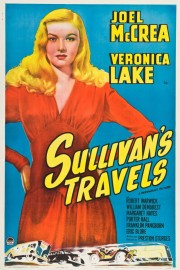Sullivan’s Travels
As we watch John L. Sullivan try to get to the sober reality of life for the average man, it’s more and more obvious how misguided that would be. It’s honorable to want to make a movie about such a way of life, but at one point, he says the phrase that will echo throughout the film- “It’s a funny thing how everything keeps shoving me back to Hollywood.” By the end, he realizes why that’s important, and it gets to the heart of why movies matter; sometimes, people just need to escape their lives.
“Sullivan’s Travels” is a film I came to because of its absence on AFI’s list of 100 greatest films in 1998, as well as how it inspired the Coen Brothers’s 2000 film, “O Brother, Where Art Thou?” That is the title Joel McCrea’s Sullivan, a Hollywood director, wants to give the serious film he has in mind that will put him in touch with the struggles of the common man. Best known for comedies, Sullivan’s journey begins by showing a new with a social conscious to studio executives in hope of getting them to sign off on his idea. They beg him to continue making comedies, but Sullivan will not rest.
Movies about filmmakers are often a hard sell for audiences, but one of the things genuinely great ones have is when they show the folly that can happen when filmmakers get so full of themselves. Sturges’s film is a beautiful encapsulation of that idea. When Sullivan decides he is going to go to the wardrobe department, get dressed up as a hobo, and go on the road, even his servant at his Hollywood home tries to talk him out of it because he knows this is not going to work out the way he wants it to. Sullivan’s first excursion is hilariously misguided, and it’s not long until he finds himself back in Hollywood, getting food at a diner with a woman (Veronica Lake) who came to Hollywood to be an actress, but now would rather get out. She gets him to take her with him on the road, but when they encounter people sleeping in the train cars, even those people can tell Sullivan and the girl are amateurs. It doesn’t take much for an audience to tell when a filmmaker is faking it.
The third act of the film is where Sullivan has his first, real sense of life outside of Hollywood, and it’s because of one of the most Hollywood twists of fate imaginable. But that’s, ultimately, the joke Sturges is aiming for here. Sullivan’s journey isn’t to get him to understand regular people for a serious film, but why his films matter to regular people. When he does, he’s ready to commit his life to telling the stories that matter to common people- the ones he was already making. “Sullivan’s Travels” is a luminous comedy, and it’s well worth watching to see Hollywood at its most blissfully self-aware.










